Charles Sturt University: Christchurch Clip Ethical Theory Analysis
VerifiedAdded on 2022/11/27
|6
|1398
|373
Essay
AI Summary
This essay analyzes the ethical issues arising from the Christchurch clip's broadcast on social media, focusing on the application of ethical theories. The paper begins with an introduction highlighting the dangers of unchecked social media content and the need for responsible broadcasting. It then delves into four classical ethical theories: utilitarianism, deontology, virtue theory, and contract theory, applying each to the case study. The analysis explores how the clip's dissemination violates utilitarian principles by causing harm, and how it fails to uphold deontological duties by sharing violent content. The essay also examines the lack of virtue in those who spread the video and the breach of implied contracts between social media platforms and their users. The conclusion emphasizes the need for stricter social media content control to prevent the spread of violence and unethical behavior, arguing that the sharing of violent materials is illegal and unethical. The essay references several academic sources to support its arguments and includes an argument visualization diagram in the appendix.
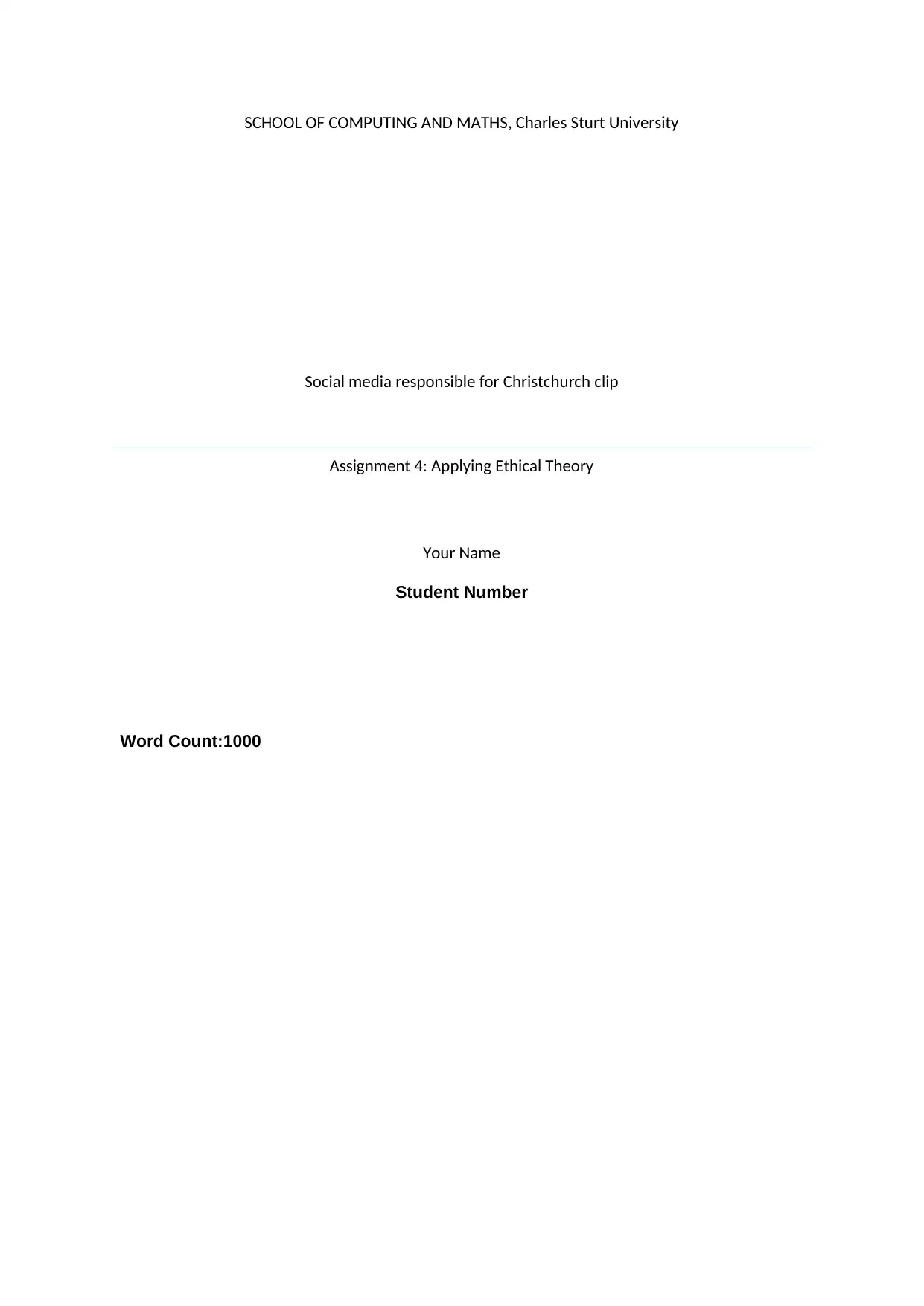
SCHOOL OF COMPUTING AND MATHS, Charles Sturt University
Social media responsible for Christchurch clip
Assignment 4: Applying Ethical Theory
Your Name
Student Number
Word Count:1000
Social media responsible for Christchurch clip
Assignment 4: Applying Ethical Theory
Your Name
Student Number
Word Count:1000
Paraphrase This Document
Need a fresh take? Get an instant paraphrase of this document with our AI Paraphraser
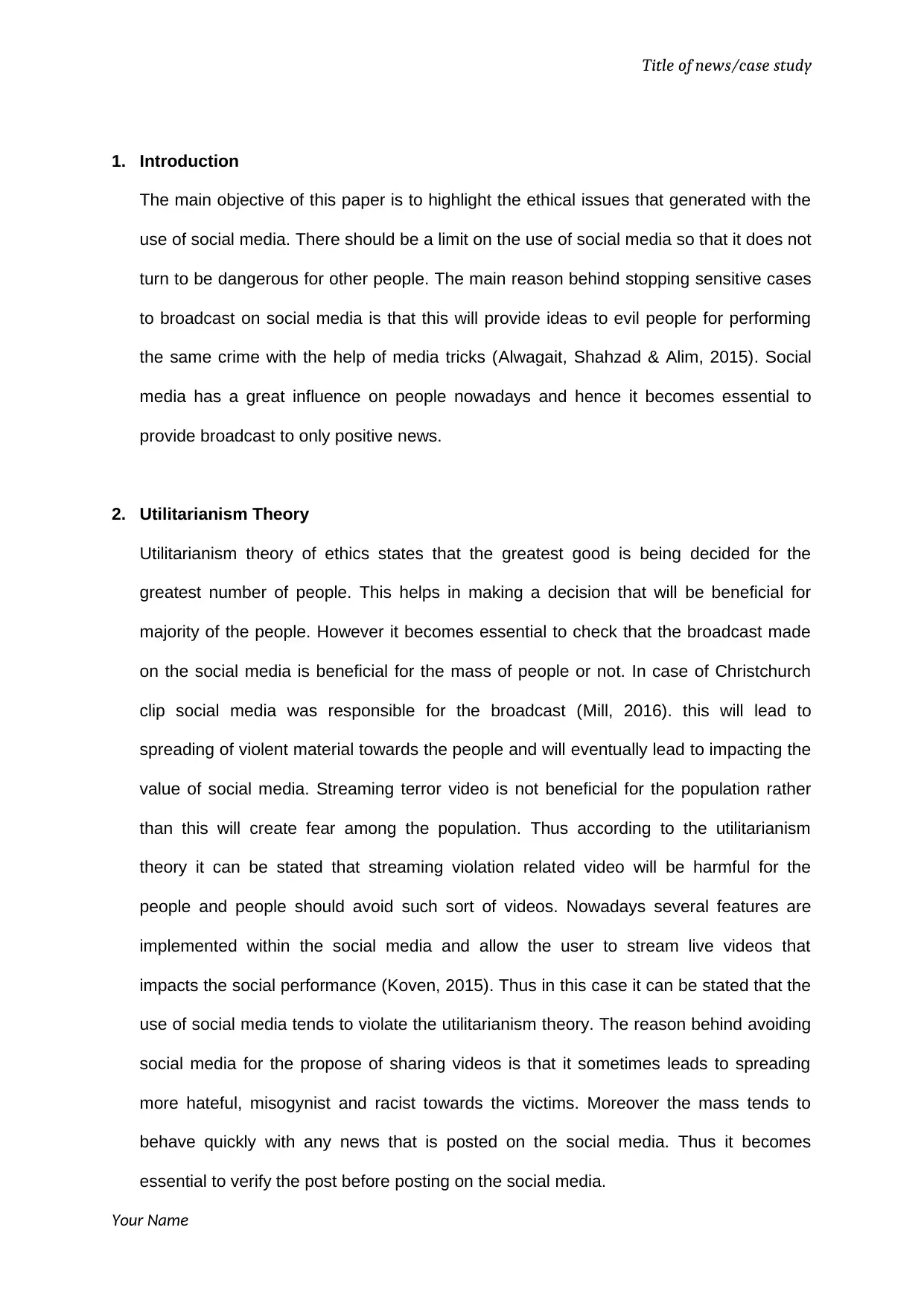
Title of news/case study
1. Introduction
The main objective of this paper is to highlight the ethical issues that generated with the
use of social media. There should be a limit on the use of social media so that it does not
turn to be dangerous for other people. The main reason behind stopping sensitive cases
to broadcast on social media is that this will provide ideas to evil people for performing
the same crime with the help of media tricks (Alwagait, Shahzad & Alim, 2015). Social
media has a great influence on people nowadays and hence it becomes essential to
provide broadcast to only positive news.
2. Utilitarianism Theory
Utilitarianism theory of ethics states that the greatest good is being decided for the
greatest number of people. This helps in making a decision that will be beneficial for
majority of the people. However it becomes essential to check that the broadcast made
on the social media is beneficial for the mass of people or not. In case of Christchurch
clip social media was responsible for the broadcast (Mill, 2016). this will lead to
spreading of violent material towards the people and will eventually lead to impacting the
value of social media. Streaming terror video is not beneficial for the population rather
than this will create fear among the population. Thus according to the utilitarianism
theory it can be stated that streaming violation related video will be harmful for the
people and people should avoid such sort of videos. Nowadays several features are
implemented within the social media and allow the user to stream live videos that
impacts the social performance (Koven, 2015). Thus in this case it can be stated that the
use of social media tends to violate the utilitarianism theory. The reason behind avoiding
social media for the propose of sharing videos is that it sometimes leads to spreading
more hateful, misogynist and racist towards the victims. Moreover the mass tends to
behave quickly with any news that is posted on the social media. Thus it becomes
essential to verify the post before posting on the social media.
Your Name
1. Introduction
The main objective of this paper is to highlight the ethical issues that generated with the
use of social media. There should be a limit on the use of social media so that it does not
turn to be dangerous for other people. The main reason behind stopping sensitive cases
to broadcast on social media is that this will provide ideas to evil people for performing
the same crime with the help of media tricks (Alwagait, Shahzad & Alim, 2015). Social
media has a great influence on people nowadays and hence it becomes essential to
provide broadcast to only positive news.
2. Utilitarianism Theory
Utilitarianism theory of ethics states that the greatest good is being decided for the
greatest number of people. This helps in making a decision that will be beneficial for
majority of the people. However it becomes essential to check that the broadcast made
on the social media is beneficial for the mass of people or not. In case of Christchurch
clip social media was responsible for the broadcast (Mill, 2016). this will lead to
spreading of violent material towards the people and will eventually lead to impacting the
value of social media. Streaming terror video is not beneficial for the population rather
than this will create fear among the population. Thus according to the utilitarianism
theory it can be stated that streaming violation related video will be harmful for the
people and people should avoid such sort of videos. Nowadays several features are
implemented within the social media and allow the user to stream live videos that
impacts the social performance (Koven, 2015). Thus in this case it can be stated that the
use of social media tends to violate the utilitarianism theory. The reason behind avoiding
social media for the propose of sharing videos is that it sometimes leads to spreading
more hateful, misogynist and racist towards the victims. Moreover the mass tends to
behave quickly with any news that is posted on the social media. Thus it becomes
essential to verify the post before posting on the social media.
Your Name
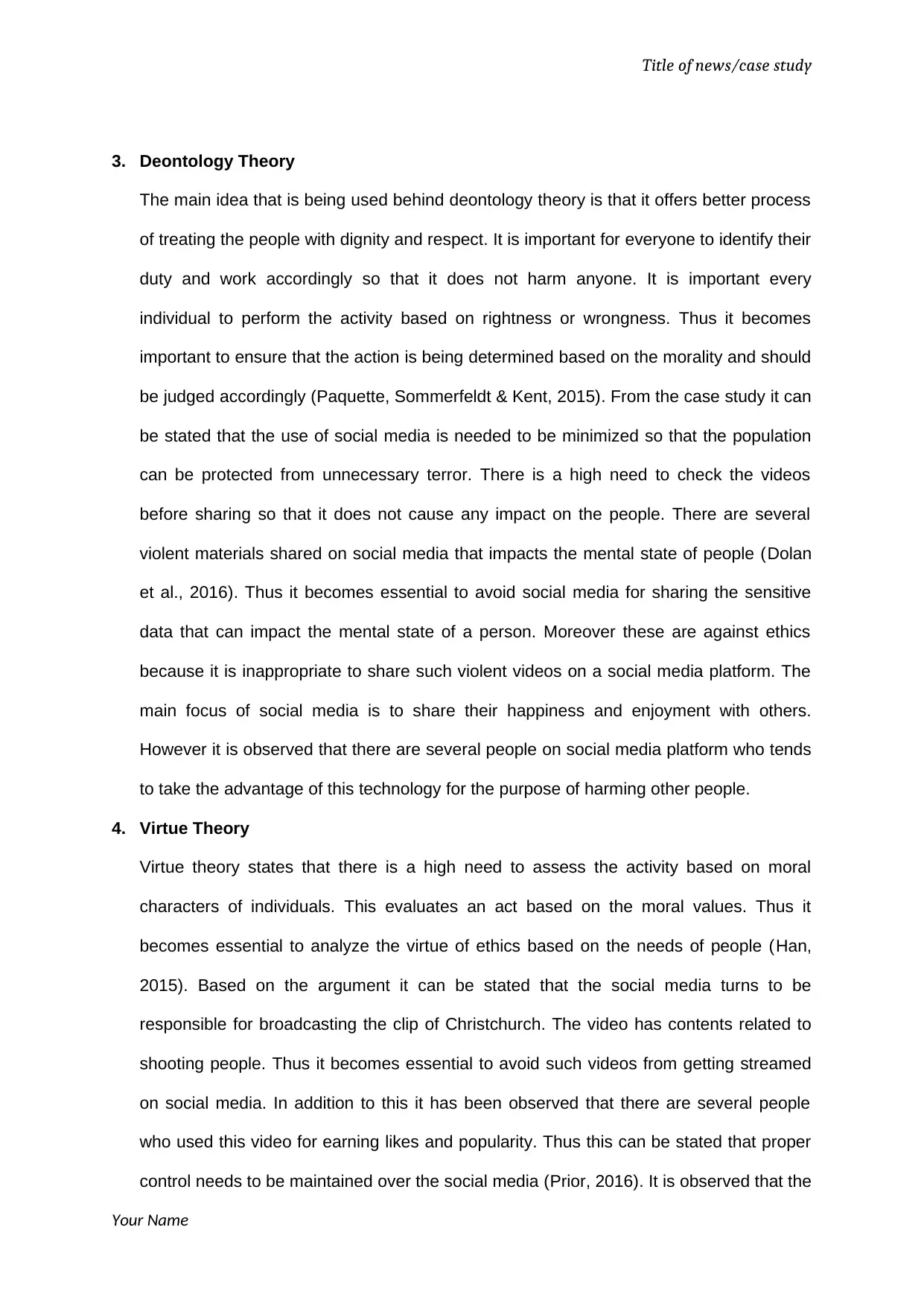
Title of news/case study
3. Deontology Theory
The main idea that is being used behind deontology theory is that it offers better process
of treating the people with dignity and respect. It is important for everyone to identify their
duty and work accordingly so that it does not harm anyone. It is important every
individual to perform the activity based on rightness or wrongness. Thus it becomes
important to ensure that the action is being determined based on the morality and should
be judged accordingly (Paquette, Sommerfeldt & Kent, 2015). From the case study it can
be stated that the use of social media is needed to be minimized so that the population
can be protected from unnecessary terror. There is a high need to check the videos
before sharing so that it does not cause any impact on the people. There are several
violent materials shared on social media that impacts the mental state of people (Dolan
et al., 2016). Thus it becomes essential to avoid social media for sharing the sensitive
data that can impact the mental state of a person. Moreover these are against ethics
because it is inappropriate to share such violent videos on a social media platform. The
main focus of social media is to share their happiness and enjoyment with others.
However it is observed that there are several people on social media platform who tends
to take the advantage of this technology for the purpose of harming other people.
4. Virtue Theory
Virtue theory states that there is a high need to assess the activity based on moral
characters of individuals. This evaluates an act based on the moral values. Thus it
becomes essential to analyze the virtue of ethics based on the needs of people (Han,
2015). Based on the argument it can be stated that the social media turns to be
responsible for broadcasting the clip of Christchurch. The video has contents related to
shooting people. Thus it becomes essential to avoid such videos from getting streamed
on social media. In addition to this it has been observed that there are several people
who used this video for earning likes and popularity. Thus this can be stated that proper
control needs to be maintained over the social media (Prior, 2016). It is observed that the
Your Name
3. Deontology Theory
The main idea that is being used behind deontology theory is that it offers better process
of treating the people with dignity and respect. It is important for everyone to identify their
duty and work accordingly so that it does not harm anyone. It is important every
individual to perform the activity based on rightness or wrongness. Thus it becomes
important to ensure that the action is being determined based on the morality and should
be judged accordingly (Paquette, Sommerfeldt & Kent, 2015). From the case study it can
be stated that the use of social media is needed to be minimized so that the population
can be protected from unnecessary terror. There is a high need to check the videos
before sharing so that it does not cause any impact on the people. There are several
violent materials shared on social media that impacts the mental state of people (Dolan
et al., 2016). Thus it becomes essential to avoid social media for sharing the sensitive
data that can impact the mental state of a person. Moreover these are against ethics
because it is inappropriate to share such violent videos on a social media platform. The
main focus of social media is to share their happiness and enjoyment with others.
However it is observed that there are several people on social media platform who tends
to take the advantage of this technology for the purpose of harming other people.
4. Virtue Theory
Virtue theory states that there is a high need to assess the activity based on moral
characters of individuals. This evaluates an act based on the moral values. Thus it
becomes essential to analyze the virtue of ethics based on the needs of people (Han,
2015). Based on the argument it can be stated that the social media turns to be
responsible for broadcasting the clip of Christchurch. The video has contents related to
shooting people. Thus it becomes essential to avoid such videos from getting streamed
on social media. In addition to this it has been observed that there are several people
who used this video for earning likes and popularity. Thus this can be stated that proper
control needs to be maintained over the social media (Prior, 2016). It is observed that the
Your Name
⊘ This is a preview!⊘
Do you want full access?
Subscribe today to unlock all pages.

Trusted by 1+ million students worldwide
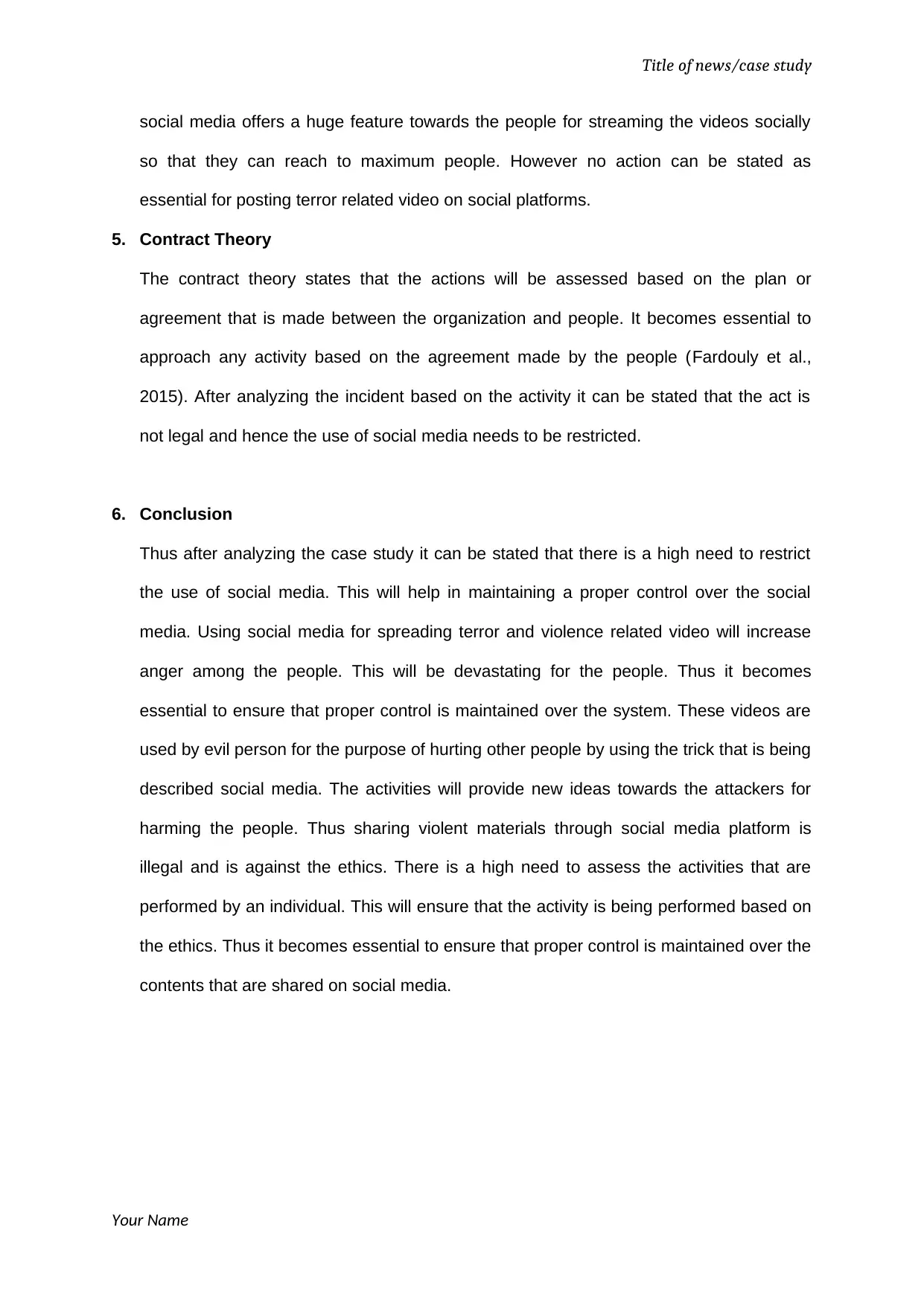
Title of news/case study
social media offers a huge feature towards the people for streaming the videos socially
so that they can reach to maximum people. However no action can be stated as
essential for posting terror related video on social platforms.
5. Contract Theory
The contract theory states that the actions will be assessed based on the plan or
agreement that is made between the organization and people. It becomes essential to
approach any activity based on the agreement made by the people (Fardouly et al.,
2015). After analyzing the incident based on the activity it can be stated that the act is
not legal and hence the use of social media needs to be restricted.
6. Conclusion
Thus after analyzing the case study it can be stated that there is a high need to restrict
the use of social media. This will help in maintaining a proper control over the social
media. Using social media for spreading terror and violence related video will increase
anger among the people. This will be devastating for the people. Thus it becomes
essential to ensure that proper control is maintained over the system. These videos are
used by evil person for the purpose of hurting other people by using the trick that is being
described social media. The activities will provide new ideas towards the attackers for
harming the people. Thus sharing violent materials through social media platform is
illegal and is against the ethics. There is a high need to assess the activities that are
performed by an individual. This will ensure that the activity is being performed based on
the ethics. Thus it becomes essential to ensure that proper control is maintained over the
contents that are shared on social media.
Your Name
social media offers a huge feature towards the people for streaming the videos socially
so that they can reach to maximum people. However no action can be stated as
essential for posting terror related video on social platforms.
5. Contract Theory
The contract theory states that the actions will be assessed based on the plan or
agreement that is made between the organization and people. It becomes essential to
approach any activity based on the agreement made by the people (Fardouly et al.,
2015). After analyzing the incident based on the activity it can be stated that the act is
not legal and hence the use of social media needs to be restricted.
6. Conclusion
Thus after analyzing the case study it can be stated that there is a high need to restrict
the use of social media. This will help in maintaining a proper control over the social
media. Using social media for spreading terror and violence related video will increase
anger among the people. This will be devastating for the people. Thus it becomes
essential to ensure that proper control is maintained over the system. These videos are
used by evil person for the purpose of hurting other people by using the trick that is being
described social media. The activities will provide new ideas towards the attackers for
harming the people. Thus sharing violent materials through social media platform is
illegal and is against the ethics. There is a high need to assess the activities that are
performed by an individual. This will ensure that the activity is being performed based on
the ethics. Thus it becomes essential to ensure that proper control is maintained over the
contents that are shared on social media.
Your Name
Paraphrase This Document
Need a fresh take? Get an instant paraphrase of this document with our AI Paraphraser
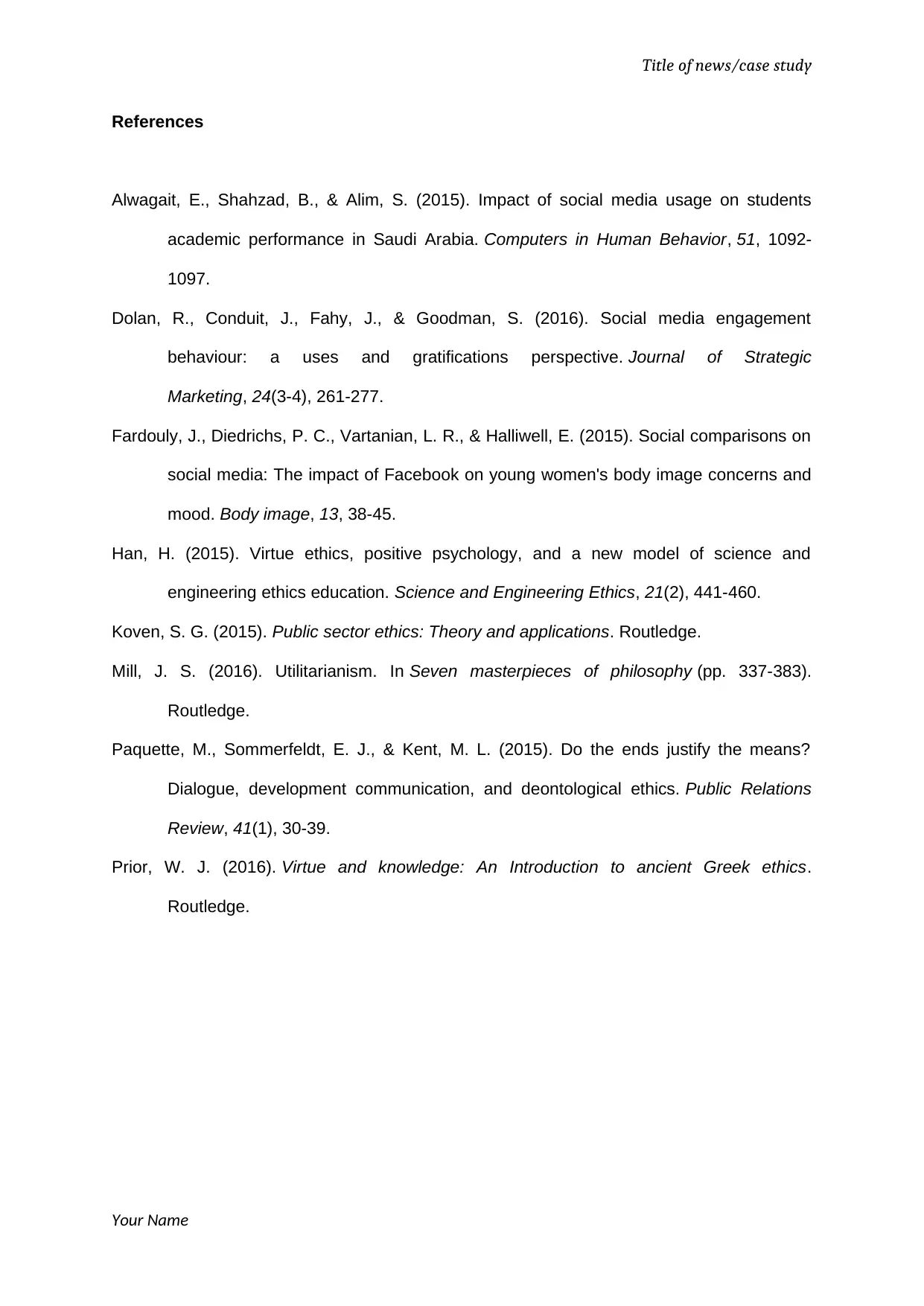
Title of news/case study
References
Alwagait, E., Shahzad, B., & Alim, S. (2015). Impact of social media usage on students
academic performance in Saudi Arabia. Computers in Human Behavior, 51, 1092-
1097.
Dolan, R., Conduit, J., Fahy, J., & Goodman, S. (2016). Social media engagement
behaviour: a uses and gratifications perspective. Journal of Strategic
Marketing, 24(3-4), 261-277.
Fardouly, J., Diedrichs, P. C., Vartanian, L. R., & Halliwell, E. (2015). Social comparisons on
social media: The impact of Facebook on young women's body image concerns and
mood. Body image, 13, 38-45.
Han, H. (2015). Virtue ethics, positive psychology, and a new model of science and
engineering ethics education. Science and Engineering Ethics, 21(2), 441-460.
Koven, S. G. (2015). Public sector ethics: Theory and applications. Routledge.
Mill, J. S. (2016). Utilitarianism. In Seven masterpieces of philosophy (pp. 337-383).
Routledge.
Paquette, M., Sommerfeldt, E. J., & Kent, M. L. (2015). Do the ends justify the means?
Dialogue, development communication, and deontological ethics. Public Relations
Review, 41(1), 30-39.
Prior, W. J. (2016). Virtue and knowledge: An Introduction to ancient Greek ethics.
Routledge.
Your Name
References
Alwagait, E., Shahzad, B., & Alim, S. (2015). Impact of social media usage on students
academic performance in Saudi Arabia. Computers in Human Behavior, 51, 1092-
1097.
Dolan, R., Conduit, J., Fahy, J., & Goodman, S. (2016). Social media engagement
behaviour: a uses and gratifications perspective. Journal of Strategic
Marketing, 24(3-4), 261-277.
Fardouly, J., Diedrichs, P. C., Vartanian, L. R., & Halliwell, E. (2015). Social comparisons on
social media: The impact of Facebook on young women's body image concerns and
mood. Body image, 13, 38-45.
Han, H. (2015). Virtue ethics, positive psychology, and a new model of science and
engineering ethics education. Science and Engineering Ethics, 21(2), 441-460.
Koven, S. G. (2015). Public sector ethics: Theory and applications. Routledge.
Mill, J. S. (2016). Utilitarianism. In Seven masterpieces of philosophy (pp. 337-383).
Routledge.
Paquette, M., Sommerfeldt, E. J., & Kent, M. L. (2015). Do the ends justify the means?
Dialogue, development communication, and deontological ethics. Public Relations
Review, 41(1), 30-39.
Prior, W. J. (2016). Virtue and knowledge: An Introduction to ancient Greek ethics.
Routledge.
Your Name
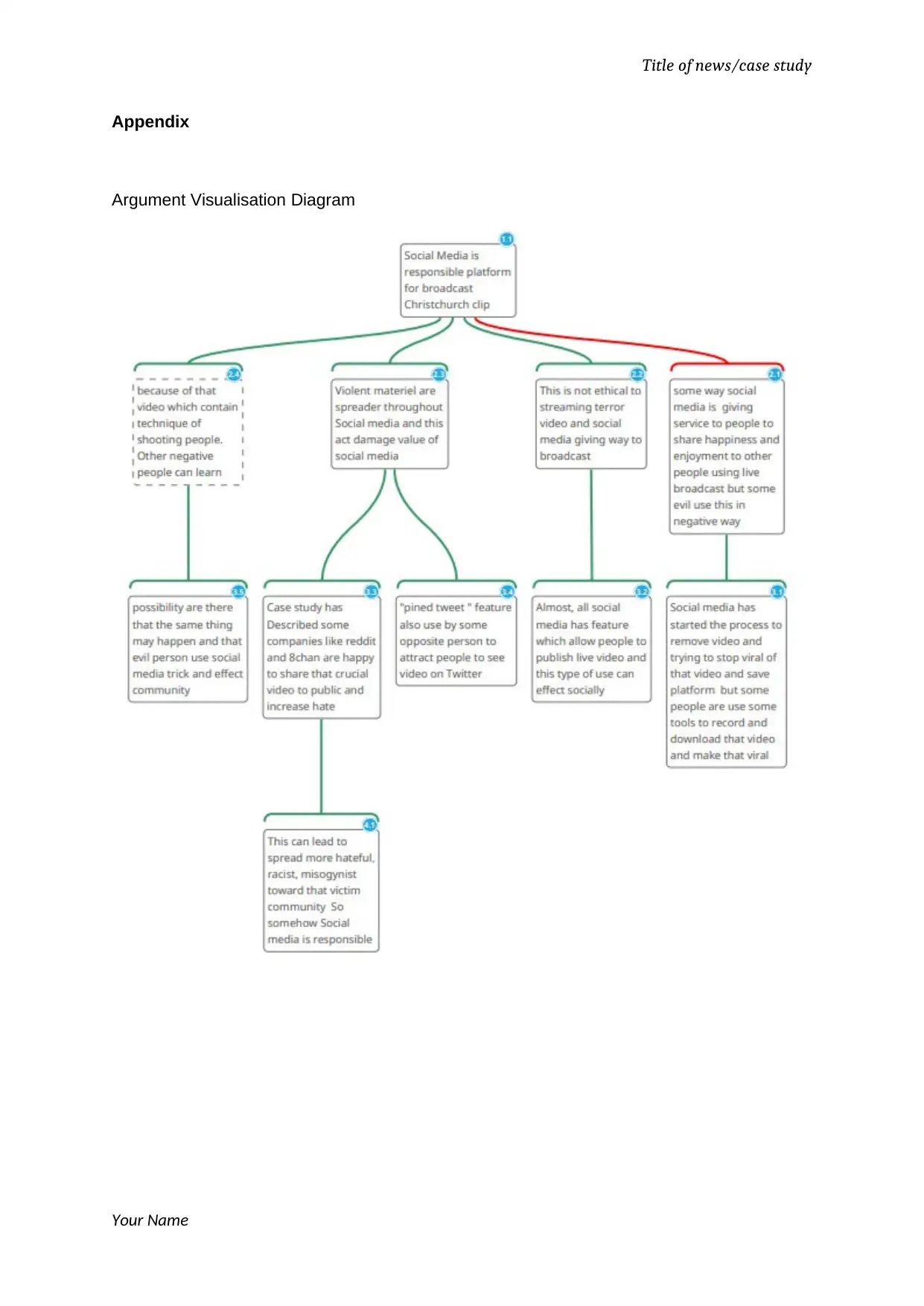
Title of news/case study
Appendix
Argument Visualisation Diagram
Your Name
Appendix
Argument Visualisation Diagram
Your Name
⊘ This is a preview!⊘
Do you want full access?
Subscribe today to unlock all pages.

Trusted by 1+ million students worldwide
1 out of 6
Related Documents
Your All-in-One AI-Powered Toolkit for Academic Success.
+13062052269
info@desklib.com
Available 24*7 on WhatsApp / Email
![[object Object]](/_next/static/media/star-bottom.7253800d.svg)
Unlock your academic potential
Copyright © 2020–2026 A2Z Services. All Rights Reserved. Developed and managed by ZUCOL.





